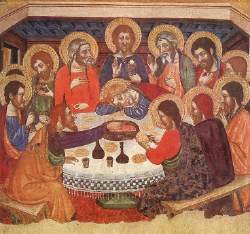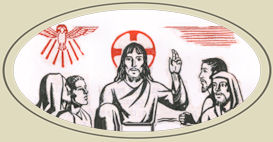Easter: May 19th
Fifth Sunday of Easter
Old Calendar: Fourth Sunday after Easter
"I give you a new commandment: love one another; just as I have loved you, you also must love one another. By this love you have for one another, everyone will know that you are my disciples."
Love is man's first and constant vocation. Love is the summary of the whole Bible. Love is the secret of the saints, the necessary way to God. It is the means to reveal God's heart to other men. But the beauty of God's love must show itself fresh and new in every Christian; for beauty, to delight and attract, must be fresh as the morning. Every deed of vital love, performed by us in our personality which nature and grace have fashioned, is like the morning of time itself. "God is love" in its mysterious fullness and infinite freshness. Utterly King and Lord, He unites the baptized of every nation in the one Mystical Body of Christ, by the one Holy Spirit, under the one Mother Mary.
Click here for commentary on the readings in the Extraordinary Form of the Roman Rite.
Sunday Readings
The first reading is taken from Acts 14:21-27. Last week we heard of St. Paul's experiences at Antioch in Piscidia during his first missionary journey. Their visit had ended on a sour note as Paul and Barnabas were expelled. The reading ended with "the two shook the dust from their feet in protest and went on to Iconium. Their disciples knew only how to be filled with joy and the Holy Spirit". Today we hear of the conclusion of this first missionary journey where Paul and Barnabas retrace their steps back through Antioch in Piscidia on their way back to Antioch in Syria where they had begun their journey.
The second reading is from the Book of Revelation 21:1-5a. For the past three weeks we have had as our second reading an account of John's privileged vision of the heavenly liturgy where he has seen the eternal sacrifice being offered to God the Father by His Son, The New and Eternal High priest and sacrifice. We have heard also the prayers being offered by the faithful. We now go to the end of John's account as he describes the Heavenly Jerusalem. It was Jesus' mission to go to the earthly Jerusalem to offer His sacrifice — this shows us the path that we must follow to reach the Heavenly Jerusalem so that we can dwell with Him there forever.
 The Gospel is from John 13:31-33a, 34-35.We are disciples, followers of Christ, but how many of us would pass the test that Christ himself lays down for deciding who are his true followers? The word "charity" unfortunately has come to have a very restricted meaning in our present-day vocabulary. It signifies giving an alms, a gift of money to a needy person. This is but a very small part of the true charity, true love of neighbor which Christ made the distinguishing mark of the true Christian. He who truly loves his neighbor must be interested, first and foremost, in those things which concern that neighbor's most important purpose in life, his eternal salvation.
The Gospel is from John 13:31-33a, 34-35.We are disciples, followers of Christ, but how many of us would pass the test that Christ himself lays down for deciding who are his true followers? The word "charity" unfortunately has come to have a very restricted meaning in our present-day vocabulary. It signifies giving an alms, a gift of money to a needy person. This is but a very small part of the true charity, true love of neighbor which Christ made the distinguishing mark of the true Christian. He who truly loves his neighbor must be interested, first and foremost, in those things which concern that neighbor's most important purpose in life, his eternal salvation.
Here is where so many good Christians fail in true charity. Effective interest in missionary activity is a case in point. Practical help in parochial matters, taking part in the various societies which are intended to build up and strengthen the faith and the devotion of the members of the parish is another obligation of true charity. So many seem to think it is no concern of theirs but it is. Advising and encouraging, with true Christian kindness, a neighbor who is beginning to grow lax in his attendance to his Christian duties, or who is forming habits or alliances which, if unchecked, will bring misery and suffering to his family, and scandal to the neighborhood, and even the possibility of his own eternal destruction, is also an exercise of real Christian charity.
There are thousands of broken homes today which would not be broken if there was true charity in those homes not only in the heart of the offender but in the hearts of the offended. There are thousands in jails and in hospitals of rehabilitation today who would not be there if their families and neighbors fulfilled their obligation of Christian charity. There are many, far too many, lapsed Catholics in the world today, who would not have lapsed had true charity been practised by their relatives and neighbors. And, last but not least, there are millions of people who have remained outside the Church of Christ because the hall-mark of charity which Christ said was its distinguishing mark was tarnished or invisible. Each one of us could, with great profit, spend a few moments today looking into ourselves and comparing our thoughts and our words and our actions with the thoughts, words and actions of love which Christ expects from his followers.
It is never too late to mend. Begin today to take a true Christian interest in the spiritual fate of your family and neighbors. Where words have already failed perhaps, try prayer and example. The grace of God will cooperate with your sincere, charitable effort.
Excepted from The Sunday Readings, Fr. Kevin O'Sullivan, O.F.M.
Commentary for the Readings in the Extraordinary Form:
Fourth Sunday after Easter "If I do not go, the Advocate will not come;. . .but if I go, I will send Him to you. . .He will (convince) the world. . .of justice" (Gospel).
"If I do not go, the Advocate will not come;. . .but if I go, I will send Him to you. . .He will (convince) the world. . .of justice" (Gospel).
The Sunday of Justice, interior and social! The Holy Spirit descends upon us with His seven Gifts at our Confirmation (symbolized by the Dove). He puts before us the imitation of Christ's sinless example, since "the prince of this world" had tried to confuse and even destroy the correct ideas of right and wrong. Hence we may now sing "a new canticle," because God "hath revealed His justice" (Introit).
The Epistle and Offertory extol the gifts of interior "justice;" the Prayer, evidently referring to social "justice," makes us realize that only God can "make (all) of one will."
How do we react in thought and action to this twofold standard of "justice" revealed in the Life of Christ and taught us by the "Spirit of truth"
— Excerpted from My Sunday Missal, Confraternity of the Precious Blood
